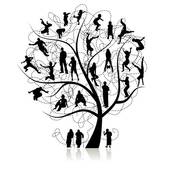 Today I am implementing one of the things I said I would do with my new blog format – and that is introduce some ‘guest‘ bloggers! Although I try my best to give you my thoughts, knowledge, and research that I’ve done, I’ll be the first to say that I don’t know everything! Plus, what I tell you is MY experience; but it is always good to get someone else’s perspective and experience, as they may have gone or going through things that I haven’t had experience with. So, learning from these wonderful folks is a good thing!
Today I am implementing one of the things I said I would do with my new blog format – and that is introduce some ‘guest‘ bloggers! Although I try my best to give you my thoughts, knowledge, and research that I’ve done, I’ll be the first to say that I don’t know everything! Plus, what I tell you is MY experience; but it is always good to get someone else’s perspective and experience, as they may have gone or going through things that I haven’t had experience with. So, learning from these wonderful folks is a good thing!Therefore, today I am introducing our first guest blogger, Cindy. I met Cindy and her husband back in 2017 by referral to this very blog! (Turns out we have the same neurologist in Grand Rapids – it’s a small world after all, huh?) Cindy was considering DBS surgery after our neurologist suggested it, and since I had my surgery completed already and was reaping the benefits, she contacted me to get my perspective on the procedure. And thus began the relationship between our families – as I have said before, it is always helpful to know you are not alone in this journey called Parkinson’s; so finding others in your area that you can talk to, bounce ideas around, and most importantly, to have a sympathetic ear (since you share the same ‘problem’) is one of the things that can help you greatly in dealing with PD or any other chronic disease!
Cindy has had some hard experiences recently with a family member, and came up with a list that I found to be very thought provoking – so much so, in fact, that I keep a portion of it tacked up on my bathroom mirror to remind me each day of what is important in life… therefore I wanted her to tell my readers her story and relate to you this list and how it came about; I think it is something all of us – no matter how young – should read and keep in mind as we go about our business day by day.
I am now going to ‘shut up‘ and give the microphone over to Cindy… Take it away!
 Hi! My name is Cindy and I was diagnosed with Parkinson’s Disease (PD) in 2009. Like many of you, I searched for answers as to what was wrong with me for a couple of years before I was finally diagnosed. My symptoms started with a twitching muscle in my right arm near my elbow, followed by a slight tremor. I thought at first that I strained my arm, but after several months I still had the tremor and that’s when I decided to see a doctor. I was prescribed propranolol for what he thought was Essential Tremor but, sadly, that was not the answer. I continued with my General Practitioner, and then a neurologist who agreed with the diagnoses of essential tremor. I continued seeing that neurologist although I felt like he was not overly familiar with Parkinson’s patients; all the while I searched the Internet and Goggled my symptoms and eventually concluded that I either had Multiple Sclerosis (MS) or Parkinson’s Disease. On the inside I was terrified. Outwardly, I tried not to act like a hypochondriac; and secretly, I wondered if this was all in my head. Shortly after I reached the conclusion that is was MS or PD, my neurologist confirmed the diagnosis – it was Parkinson’s Disease! I had developed enough symptoms for him to make the diagnosis. I was in a state of disbelief!
Hi! My name is Cindy and I was diagnosed with Parkinson’s Disease (PD) in 2009. Like many of you, I searched for answers as to what was wrong with me for a couple of years before I was finally diagnosed. My symptoms started with a twitching muscle in my right arm near my elbow, followed by a slight tremor. I thought at first that I strained my arm, but after several months I still had the tremor and that’s when I decided to see a doctor. I was prescribed propranolol for what he thought was Essential Tremor but, sadly, that was not the answer. I continued with my General Practitioner, and then a neurologist who agreed with the diagnoses of essential tremor. I continued seeing that neurologist although I felt like he was not overly familiar with Parkinson’s patients; all the while I searched the Internet and Goggled my symptoms and eventually concluded that I either had Multiple Sclerosis (MS) or Parkinson’s Disease. On the inside I was terrified. Outwardly, I tried not to act like a hypochondriac; and secretly, I wondered if this was all in my head. Shortly after I reached the conclusion that is was MS or PD, my neurologist confirmed the diagnosis – it was Parkinson’s Disease! I had developed enough symptoms for him to make the diagnosis. I was in a state of disbelief! I finally got frustrated enough with my treatment (or lack thereof) to seek a neurologist who specialized in movement disorders since I did not have much confidence in the neurologist I had been seeing. By this time, I had developed dystonia in my feet. My new neurologist tried Botox injections for treatment of the dystonia and they worked well for the first few treatments, but I felt that this was not the correct long-term treatment for me. Through the recommendation of my neurologist, a lot of research, and eventually meeting and talking with Tom and his wife, I made the tough decision to have Deep Brain Stimulation (DBS) surgery in December 2017 to alleviate my dystonia symptoms.
If all of this was not enough, I was also dealing with my 90-year-old mother who is legally blind from Macular Degeneration. In the summer of 2017 and just months away from my DBS surgery, my mother’s hip dislocated from a very aggressive form of arthritis requiring a hip replacement. At 90 years old, major surgery has a lot of risk, but we had no other choice. She was in tremendous pain and would be bed-ridden without the surgery. While prepping for the surgery, it was discovered that she also had atrial fibrillation (A-fib) and a urinary tract infection. She was given a rather aggressive anti-biotic for the infection, got her A-fib under control, and proceeded with surgery. She recovered well from the hip replacement, but we could see signs that her memory was suffering. She developed a post-op infection (C. Diff, which she ended up having three times!). During this time, her already compromised eyesight suffered significantly, making it very questionable whether she should be living alone. As a very independent woman (can I say stubborn?), she refused to allow my sister and me to get her the help she needed to stay safely in her own home. On June 9 of this year, mom fell in her garage and suffered a subarachnoid hemorrhage and three broken facial bones. It was apparent to us and also the medical professionals that she could not stay at home alone any longer. After a long, intense period, with many tears and much guilt, she moved to an assisted care facility, much to her dismay. After about a month, she started to settle in to her new home and is now doing quite well. She is getting the assistance she needs, and my sister and I are getting a little rest (emphasis on a little).
Since mom moved to an assisted living facility, she now admits that she can’t live alone; so, the time has come to sell her house. Since she is in no condition to help my sister and me, we are in the process of going through every scrap of paper, every pocket, every drawer while getting her house ready to sell. Keep in mind that my mother was born at the time of the Great Depression and therefore kept everything. Also, her failing eyesight and memory caused her to put things where they were handy at the time they were placed there, but then forgotten. As my sister and I went through every nook and cranny of that house, we both decided that we never wanted to leave a job like this to our kids. I know it was never mom’s plan, but things happen. So, we spent many nights and weekends going through her house; drawer by drawer, closet by closet, and room by room. After a full day working at her house, I started to think about this situation and decided I better write these things down, so I don’t forget the lessons I learned from my experience and came up with the following list. I don’t consider this an “end of life” list, but rather a “list to live by” – especially for those of us with aging parents. I call it, “What I have Learned.”
What I have learned:
 Tell your family and friends that you love them…. frequently.
Tell your family and friends that you love them…. frequently. I feel like we have been through a real-life battle in the past year and there were times where my mother was difficult to love, and I was sure she didn’t love me because she became so combative and said hurtful things. A kind word would have done wonders.
 You are never too young to have your affairs (and things) in order!
You are never too young to have your affairs (and things) in order!Enough said.
 Make sure you have your final wishes in writing in a way that is legal.Spend the money and use an attorney who specializes in estate planning.
Make sure you have your final wishes in writing in a way that is legal.Spend the money and use an attorney who specializes in estate planning.I was thankful that my mom and dad had the foresight to have an estate plan in place. It would have been so much harder to navigate this process without it. I am also extremely thankful that my sister and I agree on things. On the few things we questioned, we were able to discuss it reasonably and come to an agreement. Life is too short for bitter disagreements.
 Keep your important papers together, well organized, and up to date.
Keep your important papers together, well organized, and up to date.And don’t forget to tell those who will need to know at the proper time where you keep them.
 You never know what lies ahead, so be prepared for any and all possibilities.
You never know what lies ahead, so be prepared for any and all possibilities.Take into consideration that none of us know how we will end up and the best laid plans may go awry. Make known to your family a Plan B and perhaps even a Plan C. Better yet, shop for your own assisted living facility while you are still able and thinking clearly. Let your family know which ones you like and why.
Placing someone you love in a facility is one of the most gut-wrenching decisions you will ever make. My mother stated many times that an assisted living facility was ‘not in her plans‘. I sincerely doubt that it is in anyone’s plan.
 When friends or neighbors ask if they can water your plants, bring your mail in, or pick up your groceries, let them help and be thankful. People who don’t want to help won’t ask. If you say “no” too many times, they will quit asking. Remember your family may be grateful for some help.
When friends or neighbors ask if they can water your plants, bring your mail in, or pick up your groceries, let them help and be thankful. People who don’t want to help won’t ask. If you say “no” too many times, they will quit asking. Remember your family may be grateful for some help.When my mother was still at home, some of her neighbors offered to help. She refused and said that either she didn’t need the help or that her daughters would take care of it. Let me tell you, her daughters would have been thankful for a little help! I work full-time and my sister does not live locally, so if someone offered to pick up a few groceries, I would have been delighted. Believe me, after her many refusals, people did quit asking if she needed help. Maybe she didn’t need help, but we did!
 Be flexible and try to keep a positive attitude. You are not the only one trying to come to terms with your condition. It is as hard for your family as it is for you. They are struggling with you.
Be flexible and try to keep a positive attitude. You are not the only one trying to come to terms with your condition. It is as hard for your family as it is for you. They are struggling with you.I can’t emphasize enough how important a good attitude is. Not only will you be more pleasant to deal with, but anyone in the medical field will tell you, “Attitude is everything!”
 Never ask anyone to promise that they will never to put you in an assisted living facility or a nursing home or make you feel guilty if they must make that dreaded decision.
Never ask anyone to promise that they will never to put you in an assisted living facility or a nursing home or make you feel guilty if they must make that dreaded decision. Your needs may be too great for them to care for you. The bumper sticker “Live long enough to be a burden to your children” is NOT funny.
 Never lose sight of the fact that everyone in your family has their own life.
Never lose sight of the fact that everyone in your family has their own life.Don’t assume they can put their lives on hold to take care of you. It doesn’t mean they don’t love you, but they also have their own plans, dreams, and aspirations. Respect that and remember what it was like when you were younger. They will love you more for it.
 Get rid of your crap; lighten the load, live simply.
Get rid of your crap; lighten the load, live simply.Call it what you will, but all of us can do with less “stuff”. Someday, someone will have to decide what to do with those pieces of twine rolled into a ball, and all those stained plastic containers with no lids. If you have a collection of items, keep it in a manageable way. Look in drawers and closets frequently and decide what can go and what stays. No one will ever want your yellowed prom dress or your dusty Little League trophies. Memories are great and we all have them, but we live in the digital age. Take a picture of the object and then let it go. You will be surprised how liberating it feels.
 Make it easier for those grieving. They have enough on their mind. Be kind and have a plan for them as well as yourself.
Make it easier for those grieving. They have enough on their mind. Be kind and have a plan for them as well as yourself.After going through this experience with my mother, I have already apologized to our son for anything we may do in the future (history does have a way of repeating itself). My husband and I have our affairs in reasonably good order, but there are things that still need to be accomplished. I will get those items completed as soon as my mother’s house sells, and I have a moment to catch my breath.
I hope that you do not feel that my list is depressing – it was meant to be eye-opening. Look around your house and maybe start your spring cleaning a little early. Make sure your important papers are organized and tell those who need to know where they are. Most importantly, tell those who are important to you that you love them!



